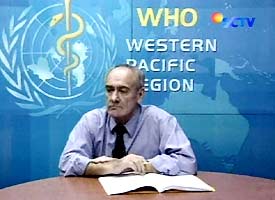 |
|
Peter Cordingley |
The countries of Europe are currently in a state of panic due to the outbreak of avian influenza, forgetting that the “breeding ground” for this disease still lies in Southeast Asia. Yesterday, Peter Cordingley, spokesperson for the World Health Organization (WHO), noted that this region is also the most likely source for a human outbreak.
The WHO representative expressed hope for increased financial commitments from wealthy nations such as Canada, Australia, and Switzerland to support Asia in the upcoming weeks.
A senior official from the World Organization for Animal Health, Alejandro Thiermann, also emphasized the need to eradicate avian influenza at its source to save costs and achieve better efficiency.
Specifically, wealthy countries must assist those in Asia in significantly improving their health and veterinary sectors, “cleaning up” the H5N1 virus at markets and farms where the risk of an avian influenza pandemic is high.
“Training and raising awareness will take time, but if done correctly, Asia will no longer be a region of concern regarding the risk of an avian influenza pandemic in the next ten years,” Thiermann asserted.
In the meantime, Thailand has announced plans to test a vaccine on humans in May 2006 and will establish a stockpile immediately if the vaccine proves effective.
Previously, Thailand had urged regional countries to establish a mechanism for mutual borrowing of medications to overcome the outbreak. Currently, the country has a stockpile of approximately 725,000 doses of Tamiflu.
Meanwhile, Roche has announced it will reduce the production time for the drug (which typically takes one year) by eliminating some steps and will send 3 million doses to the WHO. Reports indicate that Cipla, an Indian company, has announced it will formulate a drug similar to Tamiflu to address the current medication shortage, although it may be slightly less effective.
Currently, a team of EU experts has just arrived in Turkey to investigate the transmission pathways of the avian influenza virus, and a group of British experts is preparing to travel to Southeast Asia to study ways to control avian influenza outbreaks in the future.
THỦY TÙNG (According to AP, Reuters, AFP)


















































